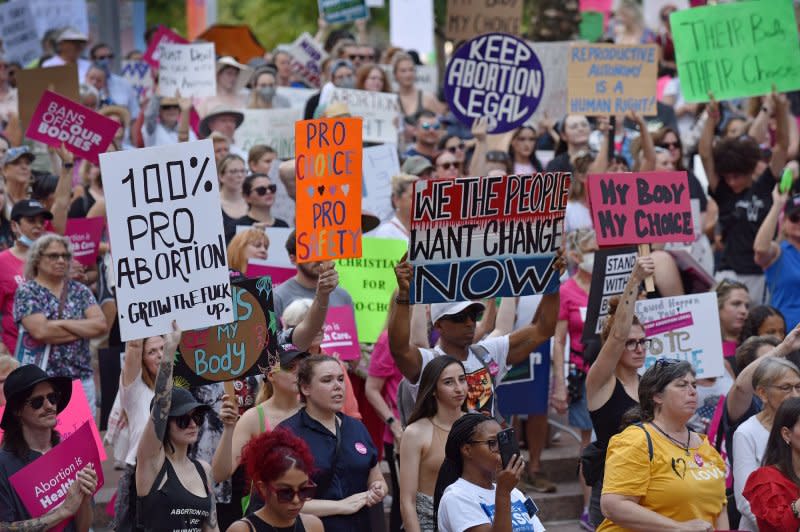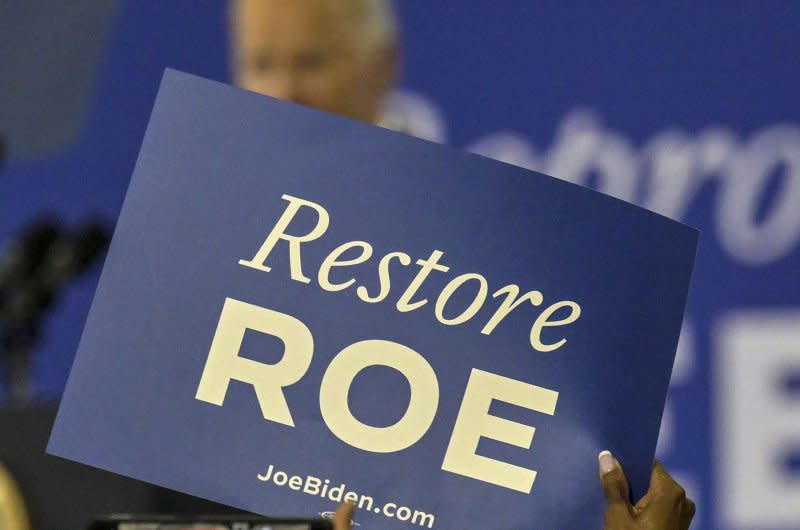6-week abortion ban takes effect in Florida; South Dakotans put access on ballot

May 1 (UPI) -- Florida's six-week abortion ban took effect Wednesday after being signed into law a year ago, while abortion advocates are submitting about 60,000 signatures to put access on the ballot in November.
Florida Gov. Ron DeSantis signed the law in April, banning abortion after the gestational age of a fetus is determined to be more than six weeks, including exceptions for pregnancies as a result of rape, incest or human trafficking if a physician reports the crime to a central abuse hotline.
Debbie Deland, president of women's rights advocacy organization Florida NOW called the six-week ban a "near total ban" in an interview with UPI, explaining that most women do not know they are pregnant within six weeks.
Florida also requires two appointments with a medical professional before an abortion can be performed. Deland said it is difficult to get one appointment, let alone two, within such a brief window.
Deland's organization and others have been preparing for the six-week ban to take effect. Several funds have been established to support travel, lodging and meals for women who need to travel out of state for an abortion. However those resources will still be limited, she said.

"The problem there is there are so many people that need abortions outside of six weeks that we need so much funds to do that," Deland said. "But we're doing what we can with the contributions that we get."
Florida already banned abortion after 15-weeks of pregnancy under a law passed in 2022.
The Florida Supreme Court on April 1 upheld that law, amid a challenge from Planned Parenthood and other abortion access advocates, while also allowing a standalone question on whether or not to enshrine abortion into the state's constitution to be placed on the ballot in November's elections.
The constitutional amendment would guarantee access to an abortion before viability. It requires a 60% vote of approval to pass.
A coalition of abortion advocates collected 910,046 signatures to get the amendment on the ballot. The state requires more than 890,000 valid signatures.
Deland said she is confident the ballot measure will pass in November. In the meantime she said thousands of women will be impacted by the ban.
"It will be months before we pass Amendment Four on the 2024 ballot," Deland said. "It's a really serious impact on women in Florida and across the southeast."
While Florida's 15-week ban already offered little access to an abortion, women from neighboring states with total bans like Alabama could come to the state, according to Deland.
For Floridians and others in the southeast region, Virginia and North Carolina, will be the closest states where women can access an abortion beyond six weeks of pregnancy.
Since turning in the petition for the constitutional amendment, Florida NOW has been working on shoring up votes. The group turned in more than enough signatures to put the amendment on the ballot but thousands of signatures were ruled invalid.
Signatures were rejected for a number of reasons, including addresses that did not match. More than 21,000 were rejected in Orange County alone.
Florida NOW is using a postcard campaign to notify individuals whose signatures were rejected that they must update these details to insure they are able to vote in November.
"We're really focused on people we know would vote 'yes' but have to fix their registration," Deland said. "We had plenty of signatures -- but that's why you've got to have a lot more than that."
Despite Deland's confidence in passing Amendment Four, she is not looking past the possibility that the state legislature may yet attempt to undermine the measure.
She recalled the amendment passed in Florida in 2018 to restore the voting rights for people with felony convictions. The legislature passed a law the following year to require those individuals to pay all fines, fees and restitution before being eligible to vote.
"They will try to figure out something to work against the abortion access amendment," Deland said. "They'll take it to the courts. We don't think it's necessarily a done deal. But it's really hard to fight a constitutional amendment."
South Dakota's petition
The petition to put abortion access on the ballot in South Dakota greatly surpassed the 35,017 signature requirement. The measure, if passed by simple majority, would guarantee the right to an abortion throughout the first trimester.
After the first trimester, the state can regulate abortion but it would still be allowed to protect the health of the mother. The language closely mirrors the precedents established in Roe vs. Wade. Rick Weiland, chairman of Dakotans for Health, told UPI this is by design. He calls it the "Restore Roe Amendment."
"We took the language from Roe vs. Wade. It's based on three trimesters as was Roe," Weiland said. "It says pretty much the same thing."
Dakotans for Health took some lessons from a failed effort to repeal a grocery tax and a successful effort to raise the minimum wage, notably finding that initiated laws are not ironclad enough to be used to protect abortion access.
"So initiated laws, the legislature can mess with them. Constitutional amendments they can't," Weiland said.
The petition effort was also faced with challenges from the state and local governments and opposing organizations, Weiland said.
"Throughout our whole signature collection process there's been an effort to try to intimidate people that were circulating the Restore Roe petition by people called the Life Defense Fund," Weiland said. "They usually show up wherever our folks are collecting signatures. They've been very combative. They haven't been very successful."
The legislature, with a super-Republican majority, passed a bill during the last session to allow people to withdraw their names from the petition. Ninety-four of 105 legislators are Republicans.
Minnehaha County Auditor Leah Anderson and the county commission enacted a measure to restrict Dakotans for Health's ability to petition outside of the Minnehaha County Administrators Building. This has been a popular location for candidates and ballot measure petitioners to collect signatures over the years, Weiland said.
Currently, petitioners can use any part of the parking lot to gather signatures. The measure would reduce their access to 0.7% of the parking lot and that space would be away from most of the foot traffic.
Dakotans for Health filed for a restraining order in federal court. Ultimately a judge ruled the auditor's measure was not allowed.
A similar effort took place in Lawrence County, but was quickly withdrawn after Dakotans for Health filed a restraining order there.
In 2022 the legislature attempted to raise the requirement to pass a citizen-driven ballot initiative from a simple majority to a three-fifths or 60% supermajority. Voters struck down the attempt with more than 67% voting against it.
"They're pulling out all the stops because they know that if this gets on the ballot it's likely to pass," Weiland said.
South Dakota joins Florida, Colorado at ballot box
A group in Colorado completed a signature campaign last month to add a constitutional amendment to its ballot as well. Unlike South Dakota and Florida, abortion is legal without restrictions in Colorado.
The measure, called Proposition 89, requires 55% approval to pass.
Along with guaranteeing the right to access an abortion, Proposition 89 would prohibit state and local governments from denying insurance coverage to government employees for abortion services.
Colorado has long been at the forefront of providing access, passing the first law in the country to legalize abortion in 1967. But a law adopted in 1984 restricted the use of tax dollars for abortion, making it illegal for government-issued insurance to cover the procedure.
Petitions for ballot measures have become common across the country following the Supreme Court's Dobbs decision in 2022.
Proponents of abortion access have since been successful on a number of fronts, either knocking down attempts to make it more difficult to pass such measures -- such as Ohio's Issue 1 -- or approving measures to protect access.
Six ballot measures related to abortion access were on the ballot during the 2022 midterm elections, including measures in California, Michigan and Vermont.
Vermont passed a constitutional amendment to enshrine the right to reproductive autonomy. Michigan also passed a constitutional amendment to guarantee access. It was brought to the ballot by petition. California passed Proposition 1, barring the state from denying or restricting abortion access.

